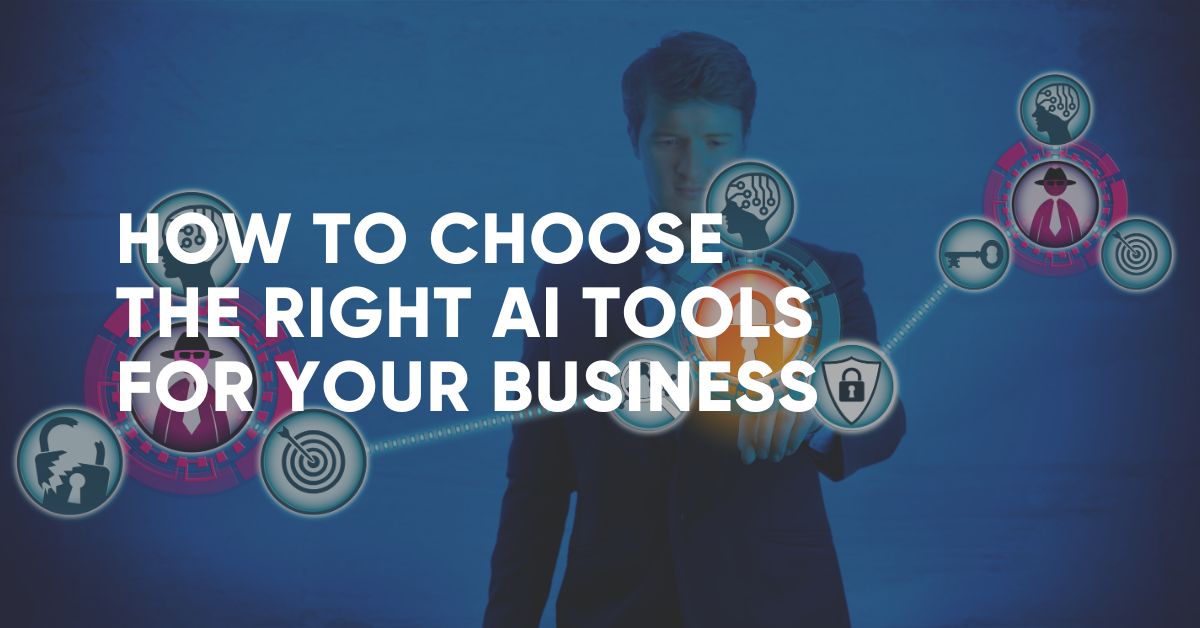HIGHLIGHTS:
- Consider AI tools that match your business’s needs and goals, data requirements, and functionality.
- Assess the AI tool’s handling of security and privacy, integration, and your business’s structure.
- Don’t be afraid to conduct a pilot test to assess the AI tool’s performance and effectiveness.
Artificial Intelligence (AI) solutions for business may feel like they have come out of nowhere, but they’ve been in development for some time. Dozens, if not hundreds, of new businesses are being launched to solve challenging business issues with AI, and the options may feel overwhelming.
We’re here to help. When choosing an AI tool for your enterprise, there are several factors to consider to ensure you make the best decision.
Here’s a step-by-step guide to help you choose the right AI tool:
Identify your business needs: Start by clearly defining the specific problems or tasks you want the AI tool to address. Determine which areas of your business could benefit from AI, such as customer service, data analysis, automation, or predictive modeling.
Set clear goals: Establish measurable goals that align with your business objectives. For example, increasing efficiency, reducing costs, improving customer satisfaction, or gaining a competitive advantage. These goals will guide your evaluation process.
Research available AI tools: Explore the market and identify the AI tools that align with your business needs and goals. Consider factors such as the tool’s functionality, features, scalability, ease of integration, and compatibility with your existing systems.
Evaluate the tool’s capabilities: Once you have a shortlist of potential AI tools, evaluate each tool’s capabilities in detail. Look for factors such as the tool’s accuracy, performance, flexibility, customization options, user-friendliness, and the availability of training and support.
Consider data requirements: AI tools often rely on data for training and operation. Assess whether the tool requires a large dataset, real-time data, or specific data formats. Consider if you have the necessary data infrastructure in place to support the tool’s requirements.
Assess security and privacy: Consider the security and privacy implications of using the AI tool. Examine the tool’s data handling practices, encryption methods, compliance with regulations (e.g., GDPR), and any potential risks associated with the tool’s implementation.
Consider scalability and integration: Determine if the AI tool can scale along with your business growth. Assess whether it can seamlessly integrate with your existing infrastructure, software, or platforms. Compatibility with your current systems is essential to avoid unnecessary disruptions.
Evaluate cost and ROI: Consider the cost of acquiring, implementing, and maintaining the AI tool. Evaluate the potential return on investment (ROI) by estimating the benefits it can bring to your business. Compare the costs and benefits across different tools to make an informed decision.
Seek user reviews and references: Look for user reviews, case studies, or references from other businesses that have used the AI tools you are considering. Assess their experiences, success stories, and any challenges they faced during implementation. Since AI is such a new discipline, it may be difficult to find vendors with a large number of customers, which makes step 10 even more important.
Conduct a pilot test: Before committing to a particular AI tool, consider conducting a pilot test or proof-of-concept project. This will help you assess the tool’s performance in your specific business environment and evaluate its effectiveness firsthand.
Vendor support and future development: Assess the reputation and reliability of the AI tool’s vendor. Consider factors such as their experience, customer support, ongoing development, and their vision for future updates and enhancements.
Make an informed decision: Finally, analyze all the information gathered throughout the evaluation process and choose the AI tool that best fits your business needs, aligns with your goals, and offers the most value for your investment.
Consider a customized solution: Generative AI tools are popping up left and right and are built to appeal to a large audience of potential customers. But you have unique business problems to solve. Perhaps you need to work with a company that can help you navigate the rapidly-evolving options and with the expertise to design and build custom tools optimized for your business.
Remember that choosing the right AI tool is not a one-size-fits-all approach. The best tool for your business will depend on your specific requirements, industry, and goals, and it may not even exist in the market. Take the time to thoroughly evaluate your options including companies that will customize AI solutions to drive the business outcomes you need.
If you need help getting started, the AI experts at ClearObject can help.
Learn More

ClearObject provided Knauf with a highly available and reliable vision system with real-time deep learning prediction capabilities, allowing users to monitor and be alerted if any of their manufacturing lines deviate from standards.
Since launching Knauf has seem immediate and dramatic impacts for both the bottom line and towards reaching their ESG (environmental, social and governance) goals. Knauf is predicting millions in savings.

